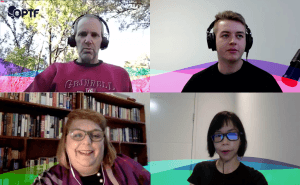RightsCon 2020 panel recap: Obstacles and opportunities for collaborating to create secure tools
August 07, 2020 / Current Affairs / By OPTF
RightsCon 2020 was jam-packed with informative presentations, thought-provoking panels, and interactive labs, delivered and devoured by some of the brightest minds in digital rights. As opposed to focusing on secure technology itself, our panel Obstacles and Opportunities for Collaborating to Create Secure Tools — run by Loki Foundation chair Simon Harman— ran the microscope over the people making and using secure tools.
Loki Foundation RightsCon 2020 panelists
Of course, a panel is nothing without great panelists — Simon was joined by Kathleen Azali (EngageMedia), Suelette Dreyfus (Blueprint for Free Speech), and Eric Johnson (Counterpart International) for an hour-long discussion about the past, present, and future of collaboration in the secure tool development space. The panel covered plenty of ground over its runtime, and we’ll be sharing the full VOD at a later date.
Challenges in secure communications
Things kicked off with a discussion about the availability of secure communications tools. The panelists agreed that while availability, diversity, and quality of secure tools has improved a lot over the last decade, there are always evolving digital security threats to protect against.
The panel then moved on to discussing the difficulties with maintaining anonymity in a world increasingly dominated by invasive surveillance and data collection regimes. Suelette noted that overall levels of anonymity are well below where many would like them to be, and that those levels are only shrinking. She went on to mention Signal as an example of a secure tool that is far from anonymous — it still identifies users based on their phone numbers, which could be an issue for users seeking anonymity, not just security.
Next, the panel discussed the critical balance between security, privacy, anonymity, and an oft-overlooked aspect of secure tool development: usability. Eric stated that developers of secure tools need to be sure they prioritise making their tools usable. He expressed concern that the balance between security and usability tends to tip too far towards security, at the expense of these tools being usable. Suelette added that without a focus on usability, security technologies simply won’t see wide adoption. Simon agreed, adding that while it’s comparatively easy to build a tool that works, it’s challenging to build a tool that works well for the people who actually need it.
On the flip side of the usability coin is accessibility. Kathleen noted that secure tools are often developed by Western entities for Western audiences, and other language localisations end up being an afterthought. She pointed out that the people who most need these tools, need them to be available in their local languages — languages that are often missing at launch, and may never be added.
An audience member chimed in via the live chat, pointing out that inclusive development and design problems extend to hardware targets too. There’s no point in developing the latest, greatest secure communications tools if those tools can only run on the latest, greatest flagship devices — most people simply can’t access that technology.
Funding for secure communications tools
The panel also discussed what goes on behind the scenes in terms of getting secure technologies funded. Everyone concurred that there is a lack of diversity in both the supply and receipt of funding in the secure tech space. Eric noted that the vast majority of funding in the space comes from the US, and consequently, the majority of grantees are also from the US, creating a highly anglo-centric sector. Suelette said she would like to see Asia entering the space, while Eric noted it would be good to see more activity from donors in India. Suelette also added that donors could make more of an effort to work with multiple teams to encourage collaboration — ensuring that funding isn’t always a zero-sum, win-or-lose game.
Secure communications tools: more important than ever
Towards the end of the panel, conversation circled around to the overall importance of digital security — especially during the ongoing COVID-19 pandemic. Kathleen noted that as more and more of the world is forced to move to online spaces — working, teaching, learning, playing — a bigger spotlight will be shone on online privacy. She mentioned video calling as one particular area of concern — for a rundown on some of the best (and worst) secure and anonymous video calling solutions, check out our blog on the subject.
Want to weigh in on the conversation yourself? Reach out to us on Twitter or send an email to contact@loki.foundation!
Latest blog posts
The OPTF and Session
The OPTF is transferring its responsibilities as steward of the Session project to the newly established Swiss foundation, the Session Technology Foundation.
READ MORE »
October 15, 2024
Cyber laws around the world: Privacy is not the policy
There is no doubt that the European Union’s GDPR has changed the cyber regulation landscape forever. As onlookers from non-EU countries urge their governments and regulators to adopt similar legislation, countries are rapidly adopting their
READ MORE »
December 04, 2022
The long and winding road : Striving for data protection in Indonesia
Juliana Harsianti is an independent researcher and journalist working at the intersection of digital technology and social impact. The long awaited Indonesian Personal Data Protection Bill was approved by the parliament on 20 September 2022.
READ MORE »
November 17, 2022
